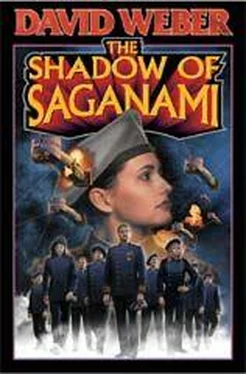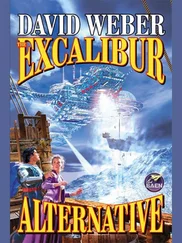"That's not a trick question," he said. "I suppose what I should have asked is what's your opinion of the decision he actually made."
"I think it took a lot of courage, Sir," she said after a moment, her tone still a bit stiff.
"Oh, there's no question of that," Khumalo agreed. "But is courage enough?" She looked a silent question at him, and he shrugged slightly. "The war was almost over, Loretta. By the time he was ambushed at Hyacinth, it was pretty clear nothing the Peeps had was going to stop Eighth Fleet whatever happened. So was it a case of good judgment, or bad? Should he have surrendered his ships, let the Peeps have the technology, knowing they wouldn't have time to take advantage of it?"
"Sir," Shoupe said in a very careful tone, "you're talking about cowardice in the face of the enemy."
"Am I?" He looked at her levelly. "Cowardice, or good sense?"
"Sir," Shoupe began, then paused. Khumalo's career had been primarily that of a military administrator. He'd commanded several fairly important bases and support stations, some quite close to the front in the First Havenite War, but he himself had never commanded in combat. Was it possible he felt threatened by Terekhov's reputation?
"Sir," she resumed after a moment, "neither you nor I were there. Anything we may think is a case of second-guessing the man who was there. I don't know what the best decision was. But I do know Captain Terekhov was the man who had to make the decision in a very narrow time window. And, with all due respect, Sir, I have to say it's far more obvious now that the Peeps were about to lose it all than it was at the time. And I suppose it's also fair to add that if he had surrendered, and if the Peeps had gotten their hands on his ships and the freighters, with their systems and cargoes intact, we'd probably be in even worse shape vis-a-vis the Peep navy than we are now."
"So you're saying you think he was right, at least given the limitations of what he knew at the time?"
"I suppose I am, Sir. I pray to God I'll never have to make a similar decision. And I'm sure Terekhov prays to God that he'll never have to make another one like it. But I think that, given the choices he had to select between, he probably picked the right one."
Khumalo looked troubled. He sheathed the dagger and laid it on his desk, then sat gazing down at it. For just a moment, his face looked worn and old, and Shoupe felt a powerful pang of sympathy. She knew he wondered why he hadn't been recalled when the Janecek Admiralty collapsed, taking his patrons with it. Was it simply because no one had gotten around to it yet? Were his recall orders already on board a dispatch boat en route to Spindle? Or had someone decided to leave him here as a suitable scapegoat if something went wrong? It was like having a double-ended Sword of Damocles hanging over his head, and now, obviously, something about Terekhov bothered him deeply.
"Sir," she heard herself saying, "forgive me, but we've worked together closely for some time now. I can see that something about Captain Terekhov, or his decisions at Hyacinth, or both, concerns you. May I ask what it is?"
Khumalo's mouth twisted for just a moment, then he pushed the dagger to one side, squared his shoulders, and looked at her.
"Captain Terekhov, despite the recent date of his promotion to senior grade, is now the second most senior ship commander on this station, after Captain Saunders. After myself, he is, in fact, the third-ranking officer in Talbott. In addition to that, his ship is the most modern and, arguably, powerful unit we have. That makes him, and his judgment, far more significant than they might have been somewhere else, especially given the diplomatic aspects of the situation."
He paused, still looking at Shoupe, and the chief of staff -nodded.
So that's at least part of it, she thought. He's wondering if Terekhov's stint at the Foreign Office means he's here to help jab us into a greater "political sensitivity," or something like that. And the fact that the Admiral's such an uncomfortable fit for the current Government must make him worry about it even more.
But if that was the case, Khumalo chose not to admit it.
"I have to ask myself whether his actions at Hyacinth reflect good judgment, as well as courage," the admiral said instead, "or if they reflect something else. With all of the hundreds of potential sparks floating around, I don't need someone whose first inclination is going to be to squirt extra hydrogen into the furnace."
"Sir, Captain Terekhov didn't strike me as a hothead," Shoupe said. "I haven't had any opportunity to form a real opinion of his judgment, but he seems levelheaded enough."
"I hope you're right, Loretta," Khumalo sighed. "I hope you're right."
"Good evening, Madam Governor."
"Good evening, Madam President." Dame Estelle Matsuko, Baroness Medusa, and Provisional Crown Governor of the Talbott Cluster in the name of Queen Elizabeth III, bowed slightly, and Samiha Lababibi, President of the Spindle System, returned it. The two women were both dark complexioned and slender, although Lababibi had a more wiry, muscular build, courtesy of a lifetime passion for yachting and skin diving. At a hundred and sixty-five centimeters, she was also seven and a half centimeters taller than Dame Estelle. But both had black hair and brown eyes, although Dame Estelle's had a pronounced epicanthic fold. She was also several decades older than Lababibi, even if her second-generation prolong made her look younger, and she'd resigned the office of Home Secretary to accept her present assignment.
"I'm glad you were able to attend," the system president continued. "I was afraid you wouldn't have returned from Rembrandt in time."
"The timing was a bit closer than I'd anticipated," Medusa agreed. "I was in the middle of discussions with the Trade Union's executive council when the report of that business on Montana came in."
"Oh, that ." Lababibi rolled her eyes with a grimace of disgust. "Little boys playing sophomoric tricks," she said.
"Little boys with pulse rifles, Madam President," Medusa replied. Lababibi looked at her, and the Provisional Governor smiled with very little humor. "We were lucky this time. Lucky this Mr. Westman was prepared to make his point without actually shooting anyone."
"Madam Governor," Lababibi said, "Stephen Westman-all those Montanans, even the women!-have far too much testosterone in their systems. They still believe all that First Landing frontiersman nonsense. Or claim they do, anyway. But I assure you, the vote there was almost as one-sided as here on Flax. Lunatics like Westman are only a tiny minority, even on Montana, and there's no way-"
"President Lababibi," Medusa interrupted pleasantly, "this is a social gathering. I really shouldn't have let myself sidetrack you into discussing Mr. Westman at all. I do think you may be… underestimating the potential seriousness of the situation, but please, don't distress yourself over it tonight. We'll have sufficient time to discuss it officially later."
"Of course." Lababibi smiled.
"Thank you." Medusa turned to scan the crowded ballroom of the Spindle System President's State Mansion. They actually called it that, she reflected, without any of the shorter, less pretentious titles which would have been used most places. Nor had they spared any expense on its interior decor. The outer wall was composed entirely of French doors, giving onto the immaculately groomed Presidential Gardens with their deliberately archaic gas-jet torches flaming in the cool spring night. The opposite wall consisted solely of floor-to-ceiling mirrors, which gave the already large room a sense of glassy vastness, and the end walls and ceiling were decorated with heroic bas relief frescoes, glittering with touches of gold leaf. The long line of tables set up beside the live orchestra was covered in snowy white linen and littered with expensive tableware and hand-blown glassware, and massive chandeliers, like cascades of crystal tears, hung from the vaulted ceiling.
Читать дальше












